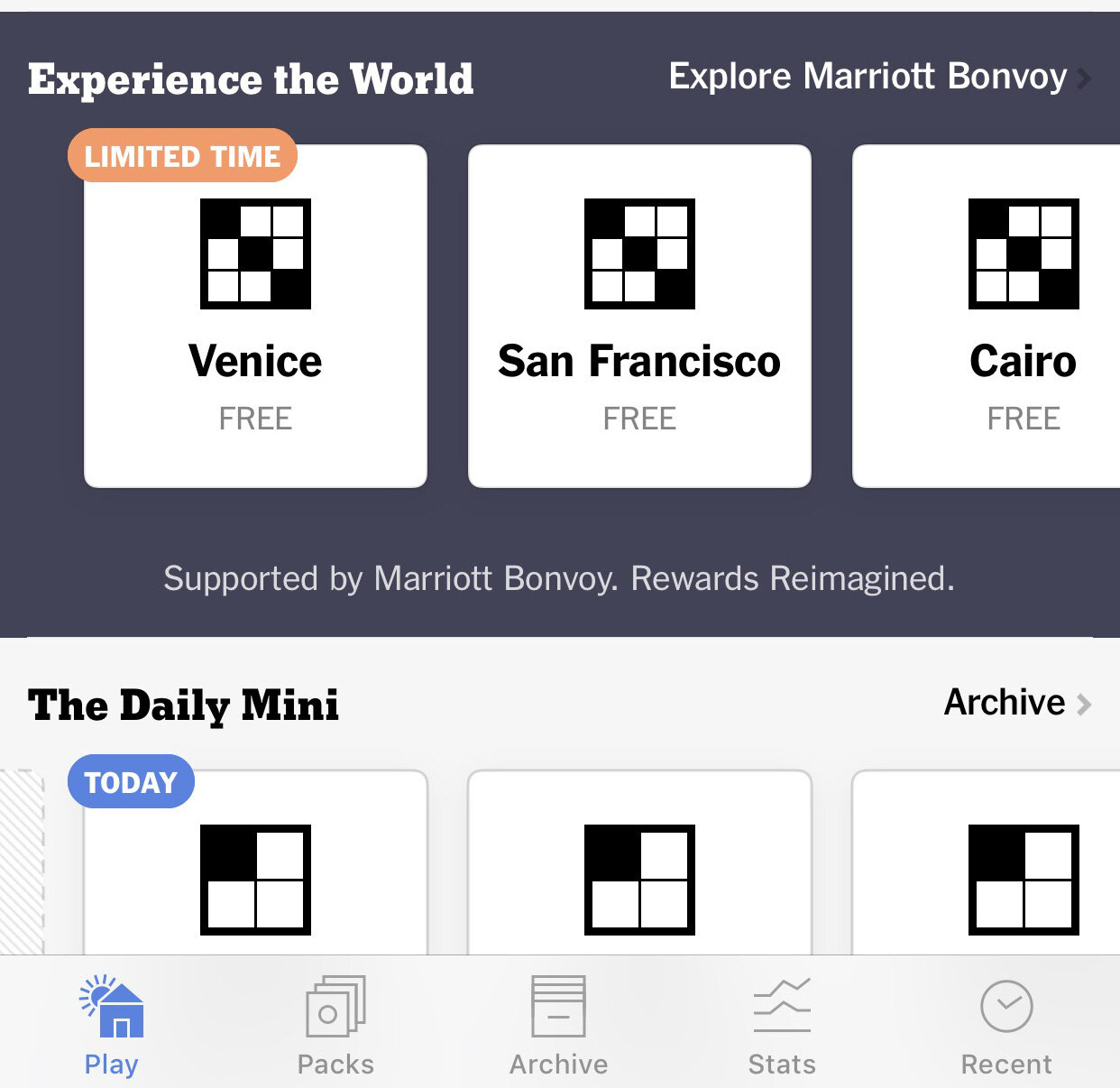In a world where consumer eyeball time is increasingly valuable, marketers are obliged to think outside the box - or perhaps inside it - to promote engagement with their branded content.
Puzzles demand a combination of fixation and interaction from the reader, factors which are bound to help a brand’s message sink in if executed tactfully. Just make sure you find a professional compiler - a campaign made in-house by an amateur compiler is most likely not going to have the same impact.
Here are some ways brands and small businesses alike can harness the crossword puzzle for your marketing purposes - online and in print.
1. Sponsor puzzles in an established publication
NYT have published sponsored crosswords in their popular app, partnering with brands like Marriot Bonvoy (pictured) and Universal Pictures.
News publishers like The New York Times and The Sydney Morning Herald have recently twigged that their hugely popular crosswords can be turned into assets for their ad sales team. These organisations have the audience, compilers and designers to put the polish on your campaign.
While the examples above are major publications, there is absolutely no reason why a small local newspaper or niche magazine couldn’t reap the benefits of offering a similar premium product to their advertisers too.
I’ve seen how effective these partnerships can be, when I compiled a giant crossword for the National Museum of Australia in 2019. Not only did it reach a great number of readers in The Canberra Times, but the Museum retained the rights to use the crossword in its in-house marketing and on its website.
If this idea fits your brand ideals, there is no reason why you couldn’t take to the extreme and sponsor an entire puzzles liftout - these are particularly popular in the summer holidays.
2. Publish puzzles in your own publications
Publishers such as the NYT and SMH have long understood the value of the puzzle page. You’ll see crosswords, trivia quizzes and sudokus in nearly every newspaper, and many genres of magazines too.
The beautifully designed Qantas magazine contains a quality crossword
But brands can also benefit by behaving more like publishers. Producing broadly appealing content such as magazines, blogs, video and podcasts can initiate new relationships with potential customers, or build loyalty in existing customers. Airlines and sporting leagues produce magazines which are particularly suited to crosswords - with customers sitting captive for extended periods.
If your company publishes a magazine, online content hub, pamphlet or program then you should consider whether a crossword would be an enhancement. Puzzles won’t suit every publication, but the response to a well-positioned puzzle will certainly increase the lifespan of your material.
3. Have a puzzle on your packaging
The Book Grocer, Northcote Victoria
I recently bought a Christmas gift from The Book Grocer in Northcote and was quite impressed by their packaging idea. It’s eye-catching, memorable and most importantly, on-brand.
4. Commission a puzzle for your event
Crosswords can be designed to fill some down-time during your event, but you’ll be surprised at how memorable the experience can be for your guests, even with people who aren’t usually into puzzles.
Puzzles certainly act as an effective ice-breaker, as well as a nice keepsake, and boy can they stir up the competitive juices! A crossword can be a truly unique part of any private or corporate function, and, if constructed and designed well, will leave an impression.
Speaking of events, when there’s not a pandemic going on, workshops for kids and adults on making/solving puzzles are always popular. If puzzles really align with your brand, you could consider a puzzle-centric event which could also be turned into video assets for your online channels.
5. Competitions
Solving puzzles can be a solitary and relaxing pursuit, but on the flipside they can also get the competitive juices flowing. By publishing puzzles to their social channels with great prizes for those who share and answer correctly, brands can generate earned media and acquire date through the entry process. After the competition is finished, these puzzles can usually live on as evergreen content on the brand’s website.



